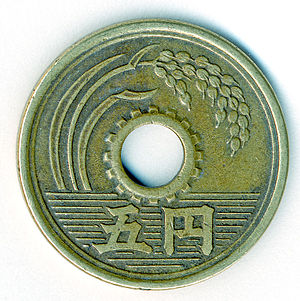| English: Japan 5 yen coin (Photo credit: Wikipedia) |
The Nikkei 225 Stock Average closed 1 percent lower and the yen strengthened as faltering exports and waning domestic demand bolster the case for more easing in coming months after the bank forecast it will miss its inflation target in the next two fiscal years. Economy Minister Seiji Maehara attended his second BOJ meeting today and, in a joint statement with Governor Masaaki Shirakawa, said that the government “strongly expects” powerful easing until deflation is overcome.
“The easing hasn’t ended,” said Hiroaki Muto, a senior economist at Sumitomo Mitsui Asset Management. “It’s possible that the BOJ will next ease around January,” when it reviews its price and growth forecasts released today, he said.
All but one of 27 economists surveyed by Bloomberg News had predicted easing today, with the majority expecting a 10 trillion yen expansion. The bank expanded its asset-purchase fund by 10 trillion yen on Sept. 19, making today the first time since May 2003 that it has loosened twice in two months.
The yen gained 0.4 percent to 79.50 per dollar at 4:52 p.m. in Tokyo after declining more than 2 percent this month. Strength in the currency has eroded the sales and profits of the nation’s exporters, with the yen reaching a postwar high of 75.35 per dollar in October last year.
Price falls have continued since May, highlighting the bank’s struggle to attain its 1 percent inflation target announced in February.
The bank said today that it expects prices excluding fresh food to rise by 0.8 percent in the fiscal year that begins in April 2014, its first projection for that year, confirming that it expects to miss its target in the next two fiscal years.
The central bank also said today it will offer unlimited loans at low interest rates to lenders to try to boost credit demand among companies and households. The loans will be based on the overnight call rate, currently 0.1 percent, it said. ... Continue to read.

No comments:
Post a Comment